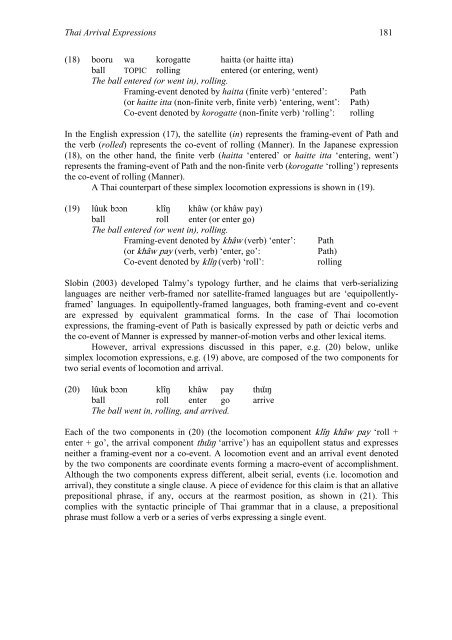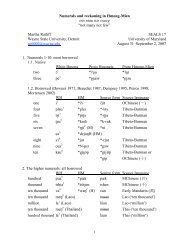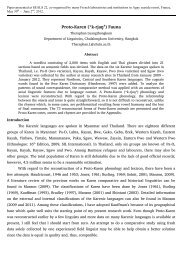proto-southwestern-tai revised: a new reconstruction - seals 22
proto-southwestern-tai revised: a new reconstruction - seals 22
proto-southwestern-tai revised: a new reconstruction - seals 22
Create successful ePaper yourself
Turn your PDF publications into a flip-book with our unique Google optimized e-Paper software.
Thai Arrival Expressions 181<br />
(18) booru wa korogatte haitta (or haitte itta)<br />
ball TOPIC rolling entered (or entering, went)<br />
The ball entered (or went in), rolling.<br />
Framing-event denoted by haitta (finite verb) ‘entered’: Path<br />
(or haitte itta (non-finite verb, finite verb) ‘entering, went’: Path)<br />
Co-event denoted by korogatte (non-finite verb) ‘rolling’: rolling<br />
In the English expression (17), the satellite (in) represents the framing-event of Path and<br />
the verb (rolled) represents the co-event of rolling (Manner). In the Japanese expression<br />
(18), on the other hand, the finite verb (haitta ‘entered’ or haitte itta ‘entering, went’)<br />
represents the framing-event of Path and the non-finite verb (korogatte ‘rolling’) represents<br />
the co-event of rolling (Manner).<br />
A Thai counterpart of these simplex locomotion expressions is shown in (19).<br />
(19) lûuk bɔɔn klîŋ khâw (or khâw pay)<br />
ball roll enter (or enter go)<br />
The ball entered (or went in), rolling.<br />
Framing-event denoted by khâw (verb) ‘enter’: Path<br />
(or khâw pay (verb, verb) ‘enter, go’: Path)<br />
Co-event denoted by klîŋ (verb) ‘roll’: rolling<br />
Slobin (2003) developed Talmy’s typology further, and he claims that verb-serializing<br />
languages are neither verb-framed nor satellite-framed languages but are ‘equipollentlyframed’<br />
languages. In equipollently-framed languages, both framing-event and co-event<br />
are expressed by equivalent grammatical forms. In the case of Thai locomotion<br />
expressions, the framing-event of Path is basically expressed by path or deictic verbs and<br />
the co-event of Manner is expressed by manner-of-motion verbs and other lexical items.<br />
However, arrival expressions discussed in this paper, e.g. (20) below, unlike<br />
simplex locomotion expressions, e.g. (19) above, are composed of the two components for<br />
two serial events of locomotion and arrival.<br />
(20) lûuk bɔɔn klîŋ khâw pay thɯ̌ ŋ<br />
ball roll enter go arrive<br />
The ball went in, rolling, and arrived.<br />
Each of the two components in (20) (the locomotion component klîŋ khâw pay ‘roll +<br />
enter + go’, the arrival component thɯ̌ ŋ ‘arrive’) has an equipollent status and expresses<br />
neither a framing-event nor a co-event. A locomotion event and an arrival event denoted<br />
by the two components are coordinate events forming a macro-event of accomplishment.<br />
Although the two components express different, albeit serial, events (i.e. locomotion and<br />
arrival), they constitute a single clause. A piece of evidence for this claim is that an allative<br />
prepositional phrase, if any, occurs at the rearmost position, as shown in (21). This<br />
complies with the syntactic principle of Thai grammar that in a clause, a prepositional<br />
phrase must follow a verb or a series of verbs expressing a single event.





